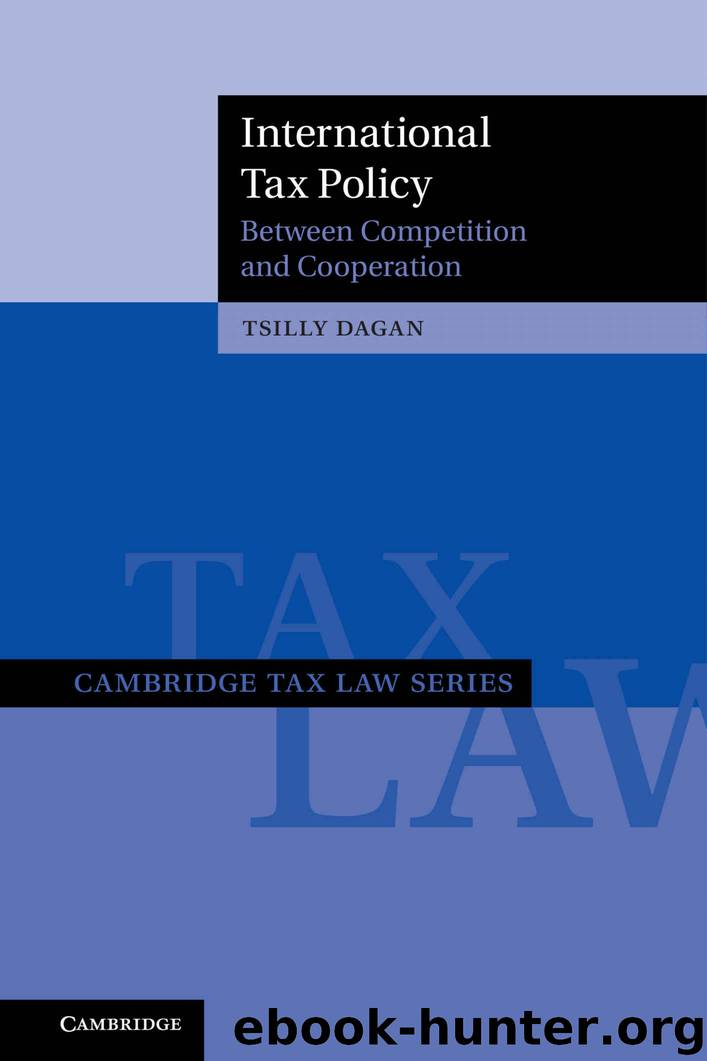International Tax Policy: Between Competition and Cooperation (Cambridge Tax Law Series) by Tsilly Dagan

Author:Tsilly Dagan [Dagan, Tsilly]
Language: eng
Format: azw3
Publisher: Cambridge University Press
Published: 2017-12-31T05:00:00+00:00
Inefficiencies may further arise in the provision of public goods and services when one country's tax choice has an external effect on the welfare of another country. Thus, for example, when the benefits from a public good provided by one country (e.g., support for R&D) spill over to another jurisdiction, the former country may be less inclined to provide that public good.23
Two additional arguments for why tax competition may be inefficient have been raised, both of which relate to state decision makers’ failure to properly evaluate the marginal costs of the public goods the state provides.24 The first argument refers to the winner's curse, whereby the highest bidders tend to pay an excessive price (or, in our context, collect too low a tax), which, post factum, they regret. The reason for this outcome is that bidding involves a certain degree of guesswork, and since winners are outliers they are often wrong.25 From this perspective, competition might drive tax rates – and public services – down to a suboptimal level. The second argument is that tax competition could generate agency costs: decision makers might prefer their own interests (be it public reelection or personal gain) when they set tax rates and favor the unrepresented few over the public good.26
Another reason why tax competition may yield inefficiencies is the externality created by tax avoidance through tax planning and the consequent ability of certain individuals and corporations to free ride on the public goods of a jurisdiction without paying its taxes. Absent competition, the state is presumably able to overcome collective-action problems in the provision of public goods by imposing its collective financing through taxation.27 When, however, taxpayers are able to avoid this taxation but the government is incapable of excluding them from enjoying the domextic public goods, the collective action problem reemerges. Although a small number of defectors might not undermine the provision of public goods, a large enough group of defecting taxpayers could lead to the collapse of the state's capacity to provide (efficient) public goods. This brings us back to square one, namely, where the market underprovides public goods and the state is unable to supply them. Thus, the state's inability to exclude free riders impairs both its incentive and ability to provide public services.
Lastly, the decentralized structure of the international tax regime is responsible for significant conflicts between jurisdictions. These conflicts, in turn, have led to the creation of loopholes. Loopholes are prominently abused by tax planners seeking to reduce their effective tax rates through what has been colloquially termed “tax arbitrage.”28 The loopholes not only create free-riding opportunities but also entail major planning costs (for taxpayers) and enforcement costs (for the government). In social welfare terms, these are pure transaction costs that reduce the collective welfare. Any effort to streamline the various taxing jurisdictions will necessarily reduce these transaction costs and thereby increase efficiency.
Download
This site does not store any files on its server. We only index and link to content provided by other sites. Please contact the content providers to delete copyright contents if any and email us, we'll remove relevant links or contents immediately.
Working for Yourself by J.D. (Nolo) Stephen Fishman(1865)
Lower Your Taxes--BIG TIME! 2019-2020 by Sandy Botkin(1609)
The Secrets of Successful Financial Planning by Dan Gallagher(1534)
Working for Yourself by Stephen Fishman J.D. (Nolo)(1525)
The Tax and Legal Playbook: Game-Changing Solutions to Your Small-Business Questions by Mark J. Kohler(1372)
Plan Your Estate by Attorney Denis Clifford(1347)
Treasure Islands by Nicholas Shaxson(1342)
475 Tax Deductions for Businesses and Self-Employed Individuals by Bernard B. Kamoroff(1335)
American Bar Association Guide to Wills and Estates by American Bar Association(1261)
How to Plan and Settle Estates by Edmund Fleming(1254)
J.K. Lasser's Small Business Taxes 2013 by Barbara Weltman(1232)
American Bar Association Guide to Wills and Estates, Fourth Edition: An Interactive Guide to Preparing Your Wills, Estates, Trusts, and Taxes by American Bar Association(1218)
Basic International Corporate Taxation by Sebastiano Garufi(1214)
Lincoln's Code by John Fabian Witt(1192)
The Essential Executor's Handbook by David G. Hoffman(1155)
Lower Your Taxes - BIG TIME! 2015 Edition: Wealth Building, Tax Reduction Secrets from an IRS Insider (Lower Your Taxes-Big Time) by Sandy Botkin(1146)
Estate Sales Made Easy by Victoria Gray(1123)
Lower Your Taxes - BIG TIME! 2017-2018 Edition: Wealth Building, Tax Reduction Secrets from an IRS Insider (Lower Your Taxes Big Time) by Botkin Sandy(1083)
Treasure Islands: Dirty Money, Tax Havens and the Men Who Stole Your Cash by Nicholas Shaxson(1073)
